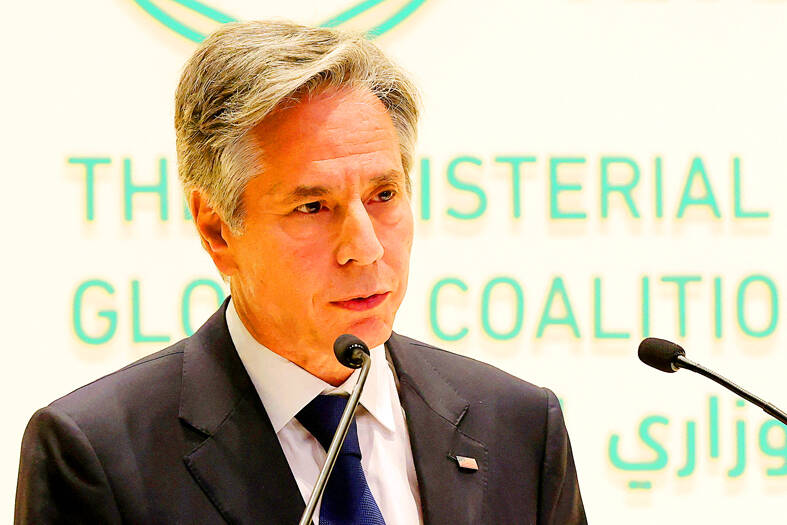The US and five of its allies on Friday condemned the use of trade practices that amount to economic coercion in a joint declaration that did not single out other countries, but appeared to be aimed at China.
Australia, Canada, Japan, New Zealand and the UK jointly released the statement with the US, saying that “trade-related economic coercion and non-market-oriented policies and practices” threatened the multilateral trading system and “harms relations between countries.”
The statement comes after G7 leaders last month agreed to an initiative to counter economic coercion and pledged action to ensure that any actors attempting to weaponize economic dependence would fail and face consequences.

Photo: Reuters
Canada, Japan, the UK and the US are also members of the G7.
The countries expressed concern about “pervasive subsidization,” anti-competitive practices by state-owned enterprises, forced technology transfer and government interference with corporate decisionmaking.
Washington has regularly raised such concerns about trade practices by Beijing, and an official from the Office of the US Trade Representative, who spoke to reporters about the joint declaration, cited China for imposing a ban on imports from Lithuania after it allowed Taiwan to open a de facto embassy.
China suspended imports of beef, dairy and beer from Lithuania last year.
Beijing last month protested the G7’s declarations, including on economic coercion, saying that the US was “pushing hard to weave an anti-China net in the Western world.”
In their joint statement, the US and its five allies raised concerns about forced labor.
“We are also seriously concerned about the use of forced labor, including state-sponsored forced labor, in global supply chains,” they said.
“All forms of forced labor are gross abuses of human rights, as well as economic issues, and it is a moral imperative to end these practices,” they added.
Separately, US Secretary of State Antony Blinken would travel to China next week, rescheduling a visit that was canceled in February after a saga over a suspected surveillance balloon, US officials said on Friday.
Blinken is expected to arrive in Beijing on Sunday next week, the first trip by a top US diplomat to China since then-US secretary of state Mike Pompeo in October 2018, US officials said on condition of anonymity.
The US Department of State has not officially announced his travel.
US National Security Council spokesman John Kirby recently said that the US would announce travel by senior officials “in the near future,” without giving details.
US President Joe Biden and Chinese President Xi Jinping (習近平) met in Bali in November last year and agreed to prevent tensions from soaring out of control, including by sending Blinken to Beijing.
Blinken abruptly canceled a trip scheduled in early February after the US said that it detected — and later shot down — a Chinese surveillance balloon flying over the US mainland, drawing fury from US lawmakers and denials by Beijing.

DEFENDING DEMOCRACY: Taiwan shares the same values as those that fought in WWII, and nations must unite to halt the expansion of a new authoritarian bloc, Lai said The government yesterday held a commemoration ceremony for Victory in Europe (V-E) Day, joining the rest of the world for the first time to mark the anniversary of the end of World War II in Europe. Taiwan honoring V-E Day signifies “our growing connections with the international community,” President William Lai (賴清德) said at a reception in Taipei on the 80th anniversary of V-E Day. One of the major lessons of World War II is that “authoritarianism and aggression lead only to slaughter, tragedy and greater inequality,” Lai said. Even more importantly, the war also taught people that “those who cherish peace cannot

STEADFAST FRIEND: The bills encourage increased Taiwan-US engagement and address China’s distortion of UN Resolution 2758 to isolate Taiwan internationally The Presidential Office yesterday thanked the US House of Representatives for unanimously passing two Taiwan-related bills highlighting its solid support for Taiwan’s democracy and global participation, and for deepening bilateral relations. One of the bills, the Taiwan Assurance Implementation Act, requires the US Department of State to periodically review its guidelines for engagement with Taiwan, and report to the US Congress on the guidelines and plans to lift self-imposed limitations on US-Taiwan engagement. The other bill is the Taiwan International Solidarity Act, which clarifies that UN Resolution 2758 does not address the issue of the representation of Taiwan or its people in

US Indo-Pacific Commander Admiral Samuel Paparo on Friday expressed concern over the rate at which China is diversifying its military exercises, the Financial Times (FT) reported on Saturday. “The rates of change on the depth and breadth of their exercises is the one non-linear effect that I’ve seen in the last year that wakes me up at night or keeps me up at night,” Paparo was quoted by FT as saying while attending the annual Sedona Forum at the McCain Institute in Arizona. Paparo also expressed concern over the speed with which China was expanding its military. While the US

‘FALLACY’: Xi’s assertions that Taiwan was given to the PRC after WWII confused right and wrong, and were contrary to the facts, the Ministry of Foreign Affairs said The Ministry of Foreign Affairs yesterday called Chinese President Xi Jinping’s (習近平) claim that China historically has sovereignty over Taiwan “deceptive” and “contrary to the facts.” In an article published on Wednesday in the Russian state-run Rossiyskaya Gazeta, Xi said that this year not only marks 80 years since the end of World War II and the founding of the UN, but also “Taiwan’s restoration to China.” “A series of instruments with legal effect under international law, including the Cairo Declaration and the Potsdam Declaration have affirmed China’s sovereignty over Taiwan,” Xi wrote. “The historical and legal fact” of these documents, as well